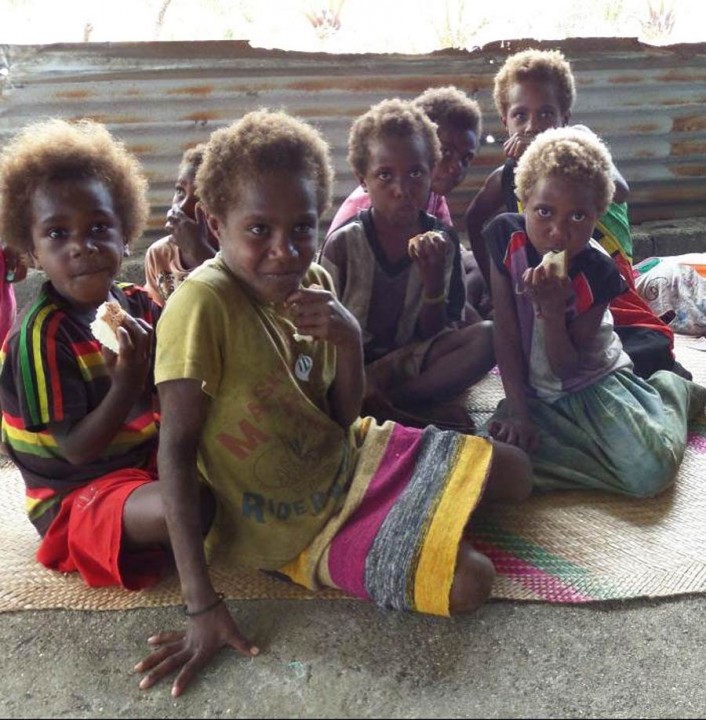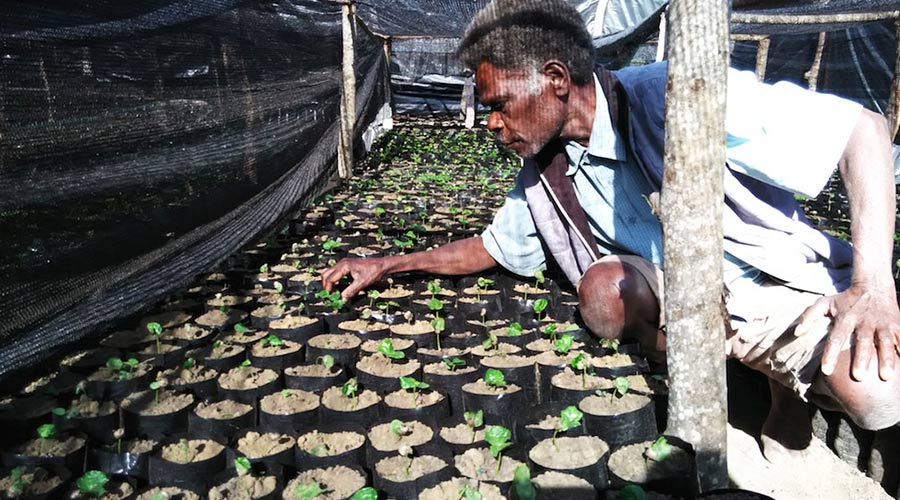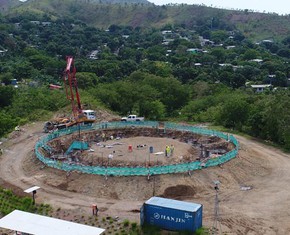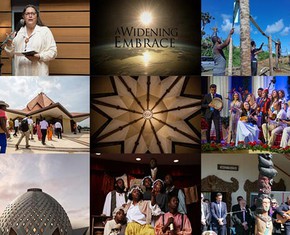If the rain does not pour down, if the wind does not blow, if the storm and tempest do not rage, the soul-refreshing springtime will not appear. If the clouds do not weep the meadows will not laugh. The hurricane and tornado, the cyclone and the blast are the harbingers of the spring.
Likewise, were there no tests and trials, no hardships and afflictions the attraction of the hearts could not be realized, the spiritual fragrances could not be obtained, nor could merciful happiness be acquired and the beauties of the celestial springtime would not have been disclosed. – Abdu’l-Baha, Star of the West – Volume 5, p. 239.

Children gathered for a class some ten days after the cyclone. Their protection and continuing education, during and since the devastating cyclone that struck Tanna in March 2015, has been a central feature of the island’s response
Ten months after Cyclone Pam devastated Vanuatu, the island of Tanna has made remarkable strides towards recovery, with youth at the heart of the process.
Tanna—one of five locations worldwide in which the first local Baha’i Houses of Worship will soon be raised—lies in the South Pacific Ocean along the archipelago making up the Republic of Vanuatu.
Over the past decade, Baha’is and their fellow islanders have worked to strengthen the fabric of community life there. In villages throughout the island, collective worship has become part of the regular pattern of life. Baha’is have witnessed a rise in social harmony and cooperation between different groups. Barriers that had previously divided people have gradually fallen away. Urged on by the support of village chiefs, the young people of the community have, in recent years, found the means to contribute to the betterment of their society through a variety of practical projects.
But in March, 2015, Cyclone Pam—a tropical cyclone with wind speeds of up to 320 km/h—ravaged the island of Tanna.
“Our houses were being blown away one by one,” explained a mother from the village of Tumah Mine. “We decided to take refuge at the school in the next village. We had to walk for about one kilometer. It was going to be a very dangerous walk as many large trees and branches were falling, and objects were flying everywhere.
“I prayed and asked Baha’u’llah to please protect us, especially our children. Sometimes we had to run, sometimes we crawled, and other times we lay flat.”
Despite Cyclone Pam’s catastrophic impact on the island and its 30,000 people — destroying not only houses, buildings, and roads but also decimating local agriculture — there were remarkably few fatalities.
Director of the Vanuatu Immigration Service Henry Tamashiro — a Baha’i in the national capital, Port Vila — has followed developments on Tanna very closely, and has been struck by the response of the population there, both during and after the storm.
Describing the community’s priorities in the immediate aftermath of the storm, he explains, “They tried to re-conceptualize the meaning of ‘relief phase’ and ‘reconstruction phase’ in light of what they had been learning about community-building.
“They concluded that the response to the cyclone could not just be about building structures. The most important thing to the community was to make sure the education of the children and youth would continue.”
The first priority then, Mr. Tamashiro explains, was to reconstruct the buildings that had hosted classes for the young. Those structures would also be used to house the vulnerable members of the community.
Mr. Tamashiro particularly emphasizes the pivotal role youth have played during and after the storm. A year and a half before Cyclone Pam, some 600 youth from Tanna attended a conference in Port Vila organized by the Baha’i community. They joined over a thousand young people from several Pacific islands. Mr. Tamashiro credits the conference for reinforcing a high sense of purpose among the youth and an orientation to service for the betterment of their communities.
Following the cyclone, this sense of purpose manifested to great effect. While the storm raged across the island, the youth of Namasmetene village, seeing almost all of the houses blown away, helped to carry the children and the elderly to a school where the people of the village took refuge.
“They demonstrated a spirit of selflessness in helping others, ensuring all were safe… They lit fires to make sure everyone was warm and dry and all were fed. They did not care just for their own families, they cared for all,” said Mrs. Naiu, a Baha’i from the village. “Many families are still thanking them. They say if it were not for their help, they would not have survived.”
The people of the island have had a strong sense of ownership and participation in their own recovery. For example, speaking about the impact on local agriculture, Iala Jacob, who is the founder and chairman of a local coffee farmer’s cooperative patterned on Baha’i principles, explains:
“The cyclone destroyed most of the coffee farms. Soon after the cyclone the Board of our cooperative met and decided to set up a nursery and plant 36,000 coffee seedlings… We will soon distribute the seedlings free of charge among the farmers.”

Iala Jacob, a local coffee farmer on the island of Tanna, in the newly-established nursery
Mr. Jacob expects that the seedlings will be enough to cover about 22 hectares of farmland, and will assist the coffee farmers to get off the ground again after the devastation of the storm.
Reconstruction has stimulated the community to reassess its building practices and learn how to draw more resourcefully from local materials. In August, 2015, local Baha’is in Tanna began to rebuild a center in Nakayelo that had been destroyed by the cyclone. The site had been an important center of activity.
About 20 local youth worked together with an architect from Papua New Guinea to design and start the construction of four buildings on the site. As part of these efforts, they also began experimenting with potential building materials that could be found locally.
“The intention of these experiments is to learn about sustainable building practices using resources within their environment,” said Henry Lape, the architect assisting with the project. He added that the group of youth would continue a process of learning, experimentation, and building after his departure.
Reflecting on the reconstruction process in Namasmetene village, Mrs. Naiu says, “These projects encouraged the community members to arise and take charge of the reconstruction process rather than waiting for an aid agency. We knew that we should not depend on aid donors, but that we should take charge of our own development.”
Far from deflecting the community from its course, the cyclone has actually served to reinforce its commitment to the progress of its people, explains Henry Tamashiro. And in the aftermath of the storm, amidst all of the work to rebuild, there is a great excitement about the House of Worship soon to be erected for the entire island.
Mr. Tamashiro attributes the inspiring response of the people of Tanna to their trust in Divine Will, even in the face of such a severe natural disaster that continues to impact their lives so many months afterwards.
“All they say is ’Thank God’. They thank God for saving their lives and the lives of their children. For them, all the material things they have lost are secondary.”
















Comments
Sign in or create an account
Continue with Googleor